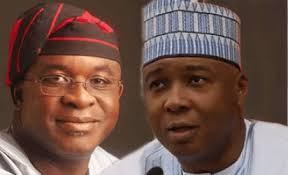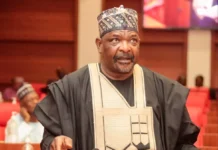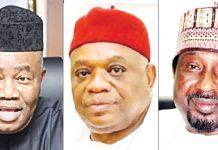Perhaps the strongest point of former President Olusegun Obasanjo when he came to power in 1999 was his integrity and it was on that basis that many believed in his avowed commitment to transparency and anti-corruption. By May 29, 2007, when he bowed out of power and took his exit, till date, it is doubtful if anybody innately takes him seriously on this premise. According to Montesquieu, a french judge and political philosopher, the failure of any leadership begins the moment it starts to compromise on the ideals on which its legitimacy was founded.
Corrupt Senate
Less than a week in office, Obasanjo’s government encouraged a situation that turned the election of Senate President to a bazaar to ensure the emergence of a particular person as Senate President. Bribe money in ‘’Ghana-Must-Go (GMG)’’ bags were ferried from place to place and from floor to floor in the Transcorp Hilton hotel in Abuja where the then senators-elect were first lodged; in order to corruptly influence the election of Evan(s) Ewerem as senate president. Late Senator Chuba Okadigbo was then most favoured candidate among majority of the PDP senators-elect. The emergence of Salisu Buhari as Speaker of the House of Representatives followed the same trend, though not as obvious.

Hence, the foundation for a massive corrupt senate was laid. It also set in litany of woes and crisis-ridden Senate which are still in vogue till date. When Ewerem fell on November 19, 1999 on the question of his credentials and integrity, late Okadigbo came on board. He did not see peace either. In a face-off between the presidency and the senate which eventually ended in the exit of the late Chuba Okadigbo as senate president. Obasanjo was accused several times of secretly funding those calling for Okadigbo’s head. He left on the basis of his own corrupt practices as senate president.
On November 1, 2000, the spines of Nigerians went cold when Adams Jagaba, Chairman of Anti-corruption Committee in the House of Representatives tendered some N40 million in eight Ghana-must-go bags claiming it was a bribe offered some members of the House by the trio of Obasanjo, his Vice, Atiku Abubakar and Peter Odili, governor of Rivers state. The money was said to have been shared among eight Representatives (one GMG bag each) with the sole aim of quickening the exit of Umar Ghali Na’aba as speaker of the House of Representatives.
The instability resulting from deployment of excessive corruption weapon has seen to the fact that within a period of six years, we had five senate presidents and three speakers of the House of Representatives.
Corruption is not only about taking money, subversion of due process is indeed the worst form of corruption. Due process was subverted in 2001 when Electoral Bill duly passed by the senate and Reps was altered at the point of signing it to law by Obasanjo.
In the letter NASS/S/SP/11/77 dated December 3, 1999 signed by the then Senate President Okadigbo to President Obasanjo, the senate accused Obasanjo of violating the constitution by its handling of the Appropriation Act of 1999. This misappropriation of public funds through non-implementation of legally approved budget was the strongest point for which Obasanjo was to be impeached in 2002 by National Assembly under the leadership of the senate president Pius Ayim and Ghali Umar Na’aba, the speaker of House of Representatives. The timely intervention of the late Alhaji Shehu Shagari, General Yakubu Gowon saved the possibility of Obasanjo becoming the first President to be removed from office by impeachment.
Classical Bills Passed By Senate
There are however some Bills passed or rejected which triggered some economic, political and social events of significant proportion in the country.
To give teeth to his anti-corruption crusade, Obasanjo presented to the senate, the ‘Prohibition and Punishment of Bribery and Other Related offences Bill’, exactly six weeks after he took office. While presenting the bill, the very first bill under the Fourth Republic, the President noted that: “we believe this law is morally right and politically correct and necessary to change the attitude of Nigerians” The Bill was also in part, a fulfilment of provisions of the ‘1999 constitution’, which had required under Section 15(5), “that the state shall abolish all corrupt practices and abuse of power” The decision to initiate such a new law was similarly informed by the realisation that given the high levels of corruption and its current modem and sophisticated nature, existing legislations could not effectively check the menace. The law aimed to prohibit, prevent and prescribe punishments for corruption, through the instrumentality of a national anti-corruption agency modelled after those of Hong Kong, Singapore etc.
The process of passage of the bill marked by a lengthy legislative squabble, and was finally passed into law on June 13, 2002 paving way for the inauguration of the Independent Corrupt Practices And Other Related Offences Commission (ICPC). Again several State Governments went to the Supreme Court to challenge the legality and powers of the body. These challenges which constituted the initial obstacles threatened the survival of ICPC, raising questions about the commitment of the political class to the war against corruption in Nigeria. This was however overcome by a June7, 2002, Supreme Court judgement, affirming the legality, status and powers of ICPC.
The Economic and Financial Crimes Commission (EFCC) is the second anti-corruption agency set up the Obasanjo government following passage of the Bill by the Senate and Reps. Its focus is to combat financial and economic crimes. The Commission is empowered to prevent, investigate, prosecute and penalize economic and financial crimes and is charged with the responsibility of enforcing the provisions of other laws and regulations relating to economic and financial crimes, including: Economic and Financial Crimes Commission Establishment act (2004), the Money Laundering Act 1995, the Money Laundering (Prohibition) Act 2004, the Advance Fee Fraud and Other Fraud Related Offences Act, the Failed Banks (Recovery of Debts) and Financial Malpractices in Banks Act 1994, the Banks and other Financial Institutions Act 1991, and Miscellaneous Offences Act.
The EFCC was established in 2003, partially in response to pressure from the Financial Action Task Force on Money Laundering (FATF), which named Nigeria as one of 23 countries non-cooperative in the international community’s efforts to fight money laundering.
An Act to provide for the repeal of the oil mineral producing area & Commission Decree 1998, and among other things, establish a new commission with a re-organised management and administrative structure for more effectiveness; and for the use of the sums received from the allocation of the Federation Account for tackling ecological problems which arise from exploration of oil minerals in the Niger-Delta area and for connected purpose was enacted by the National Assembly on July 12, 2000. It is marked 2000 Act, No. 6; by which the Niger-Delta Development Commission (NDDC) was established.
Obasanjo refused to assent to the Bill until the National Assembly vetoed Obasanjo’s declined assent shortly after. It remains the only Act passed through the National Assembly’s veto till date.
Following Constitution Amendment Bill forwarded to the senate by Obasanjo’s government, the National Assembly Joint Committee for the Constitution Review (JCCR) organized a predetermined public hearing at the six geo-political zones of Nigeria. There was also an item to amend the constitution to allow the president to go for a third term.
According to Ken Nnamani, Obasanjo told him that he has intention to bring a bill to amend the constitution in order to contest for the third time, a plot Obasanjo later denied of been involved. “If you want to be convinced that the man is only telling a lie, pick up a copy of the book written by Condoleza Rice, the former Secretary to the Government of the United States of America. It is actually an autobiography by Rice. On page 628 or page 638, she discussed Obasanjo’s meeting with Bush, how he told the former American President that he wanted to see how he could amend the Constitution so that he could go for a third term. To his surprise, Bush told him not to try it. Bush told him to be patriotic and leave by May 29, 2007’’, Nnamani said.
However, the so-called Third Term Agenda collapsed May 16, 2016 when the Senate threw out the Constitutional Amendments Bill. According to a new book titled ‘Too Good to Die: Third Term and the Myth of the Indispensable Man in Africa’, written by Chidi Odinkalu, former chairman of the National Human Rights Commission (NHRC), and Ayisha Osori, author of ‘Love Does Not Win Elections’, the third term agenda gulped about $500 million. N50 million to N70 million was offered as bribe to Reps and Senators to influence for the passage of the Bill. While some lawmakers accepted, many turned it down following Senate President Nnamani’s popular saying, ‘’every senator must answer his or her father’s name’’.
On February 9, 2010 the both chambers of the National Assembly invoked the ‘’doctrine of necessity’’ to justify extra-legal actions to pass a resolution making Vice President Goodluck Jonathan (as he then was) the Acting President and Commander in Chief of the Armed Forces.
Both chambers of the Assembly passed the resolution after President Umaru Yar’Adua, who for 78 days had been in Saudi Arabia receiving medical treatment, refused to formally empower the vice president to exercise full powers as acting president as provided for in section 145 of the 1999 constitution. It is worthy to note that provision of the constitution did not empower the National Assembly to pass such resolution. But the Senate President David Mark asserted that the Senate had been guided by the “Doctrine of Necessity” in arriving at its decision.
National Assembly had later amended the Section 145 of the constitution to the effect that once a president is away for 21 days, whether he transmits a letter or not to the National Assembly, his vice becomes acting president automatically.
Today’s Senate
On June 9, 2015, in what could be described as a perfect coup d’etat, Senator Bukola Saraki and Hon. Yakubu Dogara defied orders of their party, All Progressives Congress (APC) to emerge Senate President and Speaker of the House of Representatives in a contest that was characterized by subterfuge and skillful guile.
This was because Saraki paired with Senator Ike Ekweremadu of the opposition Peoples Democratic Party (PDP) to set aside APC preferred candidates and the pairing of Senators Ahmed Lawan and Akume for the Senate President and its Deputy respectively.
The PDP had suffered a similar fate when in 2011 lawmakers on the platform of the defunct Action Congress of Nigeria (ACN) helped Hon. Aminu Tambuwal and Hon. Emeka Ihedioha to defy the zoning formula of the PDP to emerge speaker and deputy speaker in the House.
That act of defiance by its members was later to hunt the PDP, resulted in the eventual defection of Tambuwal along with several other PDP lawmakers to the APC, and was one of the factors that led to PDP’s woeful performance at the 2015 polls.
The stage was set for the epic battle when Saraki and Dogara rejected APC’s adoption of Lawan and Gbajabiamila as the choice of the ruling party for the leadership posts in the National Assembly.
However, the party’s decision to throw up Lawan and Gbajabiamila led to a schism among APC lawmakers, enabling the PDP to captilise on the division and determine the outcome of the June 9, 2015 election.
The outcome of the parliamentary election also handed the National Leader of the ruling party, Bola Tinubu a bloody nose after his attempt to foist his preferred choice of candidates to lead the National Assembly failed.
History appears set to be repeating itself, as some senators and Reps members have rejected the endorsement of Senator Ahmed Lawan and Hon Gbajabiamila for senate president and speaker positions respectively in the 9th National Assembly when it is inaugurated on June 11.
While hosting state governors and senators-elect of the APC to a dinner at the Presidential Villa, Abuja in the night of Monday March 25, 2019, APC National Chairman, Adams Oshiomhole told the gathering that Senator Ahmed Lawan has been endorsed as the 9th senate president.
The following morning, Senator Mohammed Ali Ndume addressed a press conference to reject Lawan’s endorsement, just as he described the endorsement APC as unconstitutional and completely against the spirit of fair play.
Ndume said: “First of all, let me say that the decision by the party to settle for an individual instead of zoning the position to a particular geopolitical zone and also consulting or allowing the senators from that zone to decide who among them they prefer as Senate President, is a surprise.
“We were surprised on Monday when national chairman of our party told us a decision had been taken to adopt Ahmad Lawan as candidate from the North East for the position of the President of the Senate.
“The reason why I am shocked and I am sure that is the feeling of my colleagues, is that the constitutional provision for the emergence of the leadership of the Senate is clearly spelt out.
“Section 51 (a) of the Constitution says that “there shall be a Senate President and Deputy Senate President who shall be elected by members of the House.
Although Senator Danjuma Goje has not openly declared but there’s ample evidence that he will contest for the seat of the senate president for the 9th senate on June 10, 2019. The PDP is hanging ominously with its likely block votes of its 43 senators in support of either Ndume, Goje or Ndume just as it did in 2015.
It must be mentioned that the hostility between presidency and the Saraki-led senate has no equal in the history of Nigeria democracies. President Buhari’s government have been left hostage and prostrate as budget bill passage by the National Assembly were delayed, appointments were either approved late or out rightly rejected. Senators lenient to presidency were suspended and/or stripped of their posts in the senate. Several executive members and senate leadership were in open exchange verbal brawls and so on.
Although the Saraki-led senate passed the highest number of bills compared to other senate before it, but it also recorded the highest number of bills President ever declined assent to. It is also the senate with the highest number of former governors, the senate with the highest number of senators standing trial for corruption and other forms of crimes. Both Saraki and Ekweremadu were and are facing trials for corruption in the various courts. It is also the first senate in which the senate president and deputy senate president ended up belonging entirely to opposition party.
More than 90% of the 21 ex-governors and deputy governors now in the senate are either facing corruption trial in courts or under investigation for corruption. The 21 ex-govors and deputies in the senate currently are: Bukola Saraki of Kwara, Rabiu Musa Kwankwaso of Kano, Kabiru Gaya of Kano, Godswill Akpabio of Akwa Ibom, Theodore Orji of Abia, Abdullahi Adamu of Nasarawa, Sam Egwu of Ebonyi, Shaaba Lafiagi of Kwara, Joshua Dariye of Plateau Jonah Jang of Plateau, Aliyu Magatakarda Wamakko of Sokoto, Ahmed Sani Yarima of Zamfara, Danjuma Goje of Gombe, Bukar Abba Ibrahim of Yobe, Adamu Aliero of Kebbi, George Akume of Benue and Isiaka Adeleke of Osun. Former deputy governors in the Senate are Ms Biodun Olujimi of Ekiti and Enyinaya Harcourt Abaribe of Abia. Danladi Abubakar Sani served as the acting governor of Taraba state.
One striking characteristics of Nigeria senate is the high rate of turnover of senators after successive nation’s elections. There are no term when 50% of the senators ever return to the chamber after the general election.
Results of the senatorial election of February 23, 2019 and subsequent re-run elections indicated that 64 serving senators are not returning in June 10, 2019 when the 9th Senate will be inaugurated. In other words, only 45 senators will return to the senate. In 2015, 79 Senators couldn’t return to the red chamber, only 30 returned. This is just as 15 of the newly elected senators are former state governors as so many former governor who are senators including Saraki and Senator George Akume could not find their ways back. More so, the female senators have remained at insignificant number at each succeeding senate, a situation that can’t be helped through legislation or whatsoever in Nigeria.
The former governors coming to the 9th senate include Orji Kalu (Abia North), Theodore Orji (Abia Central), Kashim Shettima (Borno central, APC), Sam Egwu (Ebonyi north), Gabriel Suswan (Benue), Danjuma Goje (Gombe central), Ibikunle Amosu (Ogun central), Chimaroke Nnamani (Enugu east), Ibrahim Shekarau (Kano central), Tanko Al-Makura (Nassarawa south), Adamu Abdullahi (Nassarawa north), Aliyu Wammakko ( Sokoto north), Ibrahim Geidam (Yobe east), Abdul’Aziz Yari (Zamfara west) and Adamu Aliero (Kebbi central). It may be up to 16 if INEC eventually declares Governor Rochas Okorocha senator-elect. Again, most of them are EFCC candidates/clients.
Kindly contact us @ Naijalivetv@gmail.com
Call or Whatsapp: 07035262029, 07016666694, 08129340000










